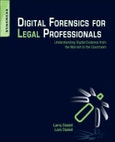Digital Forensics for Legal Professionals is a complete non-technical guide for legal professionals and students to understand digital forensics. In the authors' years of experience in working with attorneys as digital forensics experts, common questions arise again and again: "What do I ask for?" "Is the evidence relevant?" "What does this item in the forensic report mean?" "What should I ask the other expert?" "What should I ask you?" "Can you explain that to a jury?" This book answers many of those questions in clear language that is understandable by non-technical people. With many illustrations and diagrams that will be usable in court, it explains technical concepts such as unallocated space, forensic copies, timeline artifacts and metadata in simple terms that make these concepts accessible to both attorneys and juries.
The book also explains how to determine what evidence to ask for, evidence that might be discoverable, and furthermore, it provides an overview of the current state of digital forensics, the right way to select a qualified expert, what to expect from that expert, and how to properly use experts before and during trial. With this book, readers will clearly understand different types of digital evidence and examples of direct and cross examination questions. It includes a reference of definitions of digital forensic terms, relevant case law, and resources.
This book will be a valuable resource for attorneys, judges, paralegals, and digital forensic professionals.
Please Note: This is an On Demand product, delivery may take up to 11 working days after payment has been received.
Table of Contents
Section 1: What is Digital Forensics? Chapter 1. Digital Evidence is Everywhere Chapter 2. Overview of Digital Forensics Chapter 3. Digital Forensics The Sub-Disciplines Chapter 4. The Foundations of Digital Forensics Best Practices Chapter 5. Overview of Digital Forensics Tools Chapter 6. Digital Forensics at Work in the Legal System
Section 2: Experts Chapter 7. Why Do I Need an Expert? Chapter 8. The Difference between Computer Experts and Digital Forensic Experts Chapter 9. Selecting a Digital Forensics Expert Chapter 10. What to Expect from an Expert Chapter 11. Approaches by Different Types of Examiners Chapter 12. Spotting a Problem Expert Chapter 13. Qualifying an Expert in Court
Sections 3: Motions and Discovery Chapter 14. Overview of Digital Evidence Discovery Chapter 15. Discovery of Digital Evidence in Criminal Cases Chapter 16. Discovery of Digital Evidence in Civil Cases Chapter 17. Discovery of Computers and Storage Media Chapter 18. Discovery of Video Evidence Chapter 19. Discovery of Audio Evidence Chapter 20. Discovery of Social Media Evidence Chapter 21. Discovery in Child Pornography Cases Chapter 22. Discovery of Internet Service Provider Records Chapter 23. Discovery of Global Positioning System Evidence Chapter 24. Discovery of Call Detail Records Chapter 25. Obtaining Expert Funding in Indigent Cases
Section 4: Common Types of Digital Evidence Chapter 26. Hash Values: The Verification Standard Chapter 27. Metadata Chapter 28. Thumbnails and the Thumbnail Cache Chapter 29. Deleted Data Chapter 30. Computer Time Artifacts (MAC Times) Chapter 31. Internet History (Web and Browser Caching) Chapter 32. Windows Shortcut Files (Link Files) Chapter 33. Cellular System Evidence and Call Detail Records Chapter 34. Email Evidence Chapter 35. Social Media Chapter 36. Peer to Peer Networks and File Sharing Chapter 37. Cell Phones Chapter 38. Video and Photo Evidence Chapter 39. Databases Chapter 40. Accounting Systems and Financial Software Chapter 41. Multiplayer Online games Chapter 42. Global Positioning Systems
Authors
Larry Daniel Principal Consultant, Guardian Digital Forensics, an Envista Forensics Company. Larry Daniel is a digital forensics examiner and cellular records analyst with Guardian Digital Forensics. Larry has testified over 45 times in state and federal courts, and is one of the top digital forensic examiners in the US, with experience in hundreds of civil and criminal cases involving all types of digital evidence, from computers to black boxes to cell phones. Larry is a sought-after speaker for both technical and legal conferences, and is the co-author of the successful Syngress title Digital Forensics for Legal Professionals. Lars Daniel Digital Forensics Examiner with Guardian Digital Forensics. Lars Daniel is a digital forensics examiner at Guardian Digital Forensics.Lars is an EnCase Certified Examiner (EnCE), an AccessData Certified Examiner (ACE), an AccessData Certified Mobile Examiner (AME) a Certified Telecommunications Network Specialist (CTNS), Certified Wireless Analyst (CWA), a Certified Internet Protocol Telecommunications Specialist (CIPTS), and a Certified Telecommunications Analyst (CTA).
He spoke at the largest annual digital forensics conference, the Computer Enterprise and Investigations Conference (CEIC), in 2011 and 2013, and at the EnFuse conference in 2016.
Lars has qualified as an expert witness and testified in both state and federal court, qualifying as a digital forensics expert, computer forensics expert, a cell phone forensics expert, a video forensics expert, and a photo forensics expert.
He has attended over 300 hours of forensic training and has worked on over 600 cases involving murder, child pornography, terrorism, rape, kidnapping, intellectual property, fraud, wrongful death, employee wrongdoing and insurance losses among numerous other types of cases.
Lars is the co-author of the book Digital Forensics for Legal Professionals: Understanding Digital Evidence from the Warrant to the Courtroom, published by Syngess, an imprint of Elsevier Publishing.
He has extensive experience in both civil and criminal defense cases. He provides Continuing Legal Education (CLE) training classes for attorneys across the United States.








